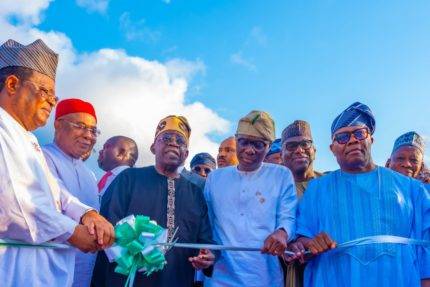President Bola Tinubu officially inaugurated the construction of the ambitious 700km Lagos-Calabar Coastal Highway, highlighting its transformative potential for Nigeria’s transportation infrastructure. Speaking from the Ahmadu Bello Way in Victoria Island, Lagos, the President Tinubu emphasized that this project would not only revolutionize transportation but also enhance the economic vitality of each region it traverses. The highway, which will stretch across nine states along Nigeria’s coastal shoreline, aims to link major highway corridors (A1, A2, A3, and A4) vertically, facilitating seamless travel from the western, central, and eastern parts of the country.
The coastal highway’s strategic importance cannot be overstated. Starting from Lagos and ending in Cross River State, with a northern spur reaching the central region, this project promises to significantly reduce travel time and logistics costs. It is poised to be a critical artery for trade and movement, bolstering the connectivity between different economic zones and fostering regional integration. By connecting these diverse areas, the highway is expected to drive socio-economic growth, create jobs, and open up new markets for local businesses, thus playing a pivotal role in Nigeria’s development.
Boosting Tourism and Economic Growth
President Tinubu also used the occasion to announce the virtual flag-off of the design and procurement for other significant projects, including the 1,000km Sokoto-Badagry Highway and the 461km Enugu-Abakaliki-Ogoja Road. These projects are part of a broader vision to improve Nigeria’s road infrastructure, which includes the reconstruction and rehabilitation of 330 roads and bridges across the six geopolitical zones. By enhancing connectivity and accessibility, these infrastructure projects are expected to stimulate tourism, an industry with immense untapped potential in Nigeria.
The Lagos-Calabar Coastal Highway, in particular, is anticipated to be a major boon for the tourism sector. By providing easier access to the scenic coastal regions and cultural sites, the highway will attract both domestic and international tourists. Improved roads mean safer and more comfortable travel experiences, which can lead to increased visitor numbers and longer stays, thereby boosting local economies. Tourism-related businesses, from hotels and restaurants to tour operators, stand to gain significantly from the influx of visitors, driving further economic development in the regions.
President Tinubu commended the collaborative efforts of various stakeholders in bringing this vision to fruition. He praised the Minister of Works, Engr. David Umahi, for his dedication to the project, and acknowledged the contributions of Hitech Construction Company and its leadership, Ambassador Gilbert Chagoury and Engr. Ronald Chagoury. Highlighting a past achievement, he recounted how the indigenous company successfully executed a project to protect Lagos from Atlantic Ocean encroachment, transforming a potential disaster into a valuable asset.
The President Tinubu confidence in the project’s success was palpable. “Today is my day to boast. The deal is done. The dream is realizable. The determination to build a nation of prosperity is possible. We said we would build this road, and we are determined to do it,” he declared. President Tinubu assured Nigerians of the government’s unwavering commitment to completing the highway, promising that it would mark a significant milestone in the country’s journey towards prosperity and development.
President Tinubu reiterates Lagos -Calabar Coastal Highway Project for Future Generations
President Tinubu has announced the commencement of the Lagos-Calabar Coastal Highway project, highlighting its significance for future generations. The President Tinubu emphasized that this project is not merely about constructing a road but creating a lasting legacy and setting a high standard for the timely provision of world-class infrastructure. “We have a road that will outlive all of us here. That is how to build the future,” he said, underscoring the enduring impact of the project.
The President Tinubu described the 700km road as a symbol of hope, unity, and prosperity, poised to connect communities and bring economic opportunities to millions. By enhancing connectivity, the project aims to foster economic growth and social cohesion across the regions it traverses. “For our nation to excel, we just have to be bold and courageous in our endeavours,” President Tinubu remarked, reinforcing the need for visionary leadership in pursuing ambitious infrastructure projects.
Economic Opportunities and Employment Benefits
One of the major highlights of President Tinubu’s announcement was the extensive economic opportunities the highway project is expected to generate. The construction of the road will provide direct employment for thousands of workers, while indirectly creating tens of thousands of additional jobs. This boost in employment is anticipated to stimulate local economies and enhance the livelihoods of numerous communities along the route.
Moreover, the project will facilitate access to production and marketing centers for approximately 30 million people, accelerating economic development and ensuring the free movement of goods and people. By opening new economic avenues, the highway is set to become a critical artery for Nigeria’s economic progress. The President Tinubu also noted that the project will complement the expansion of the country’s maritime industry, particularly following the recent United Nations decision to extend Nigeria’s continental shelf by an additional 16,300 square kilometers.
Regional Cooperation and Local Support
The Lagos-Calabar Coastal Highway project has garnered significant support from various regional leaders and local communities. Engr. Umahi, the Minister overseeing the project, affirmed that due process was followed in awarding the contract, lauding President Tinubu as a visionary leader. He disclosed that sections 3 and 4 of the project would commence from Akwa Ibom and Cross River States, ensuring a balanced regional development approach.
Local leaders, such as the Oniru of Iruland, Oba Abdulwasiu Lawal, have pledged their support for the project, promising to remove any obstacles that may hinder its progress. The community has already made sacrifices to facilitate the project’s realization, and Oba Lawal has called for adequate compensation for those affected. Additionally, Governors Babajide Sanwo-Olu of Lagos, Abdulrahman Abdulrazaq of Kwara, and Hope Uzodinma of Imo have expressed their unwavering support, viewing the project as a testament to sub-national collaboration and a vote of confidence in the government’s vision for infrastructure development.
Table of Contents
Discover more from OGM News NG
Subscribe to get the latest posts sent to your email.














